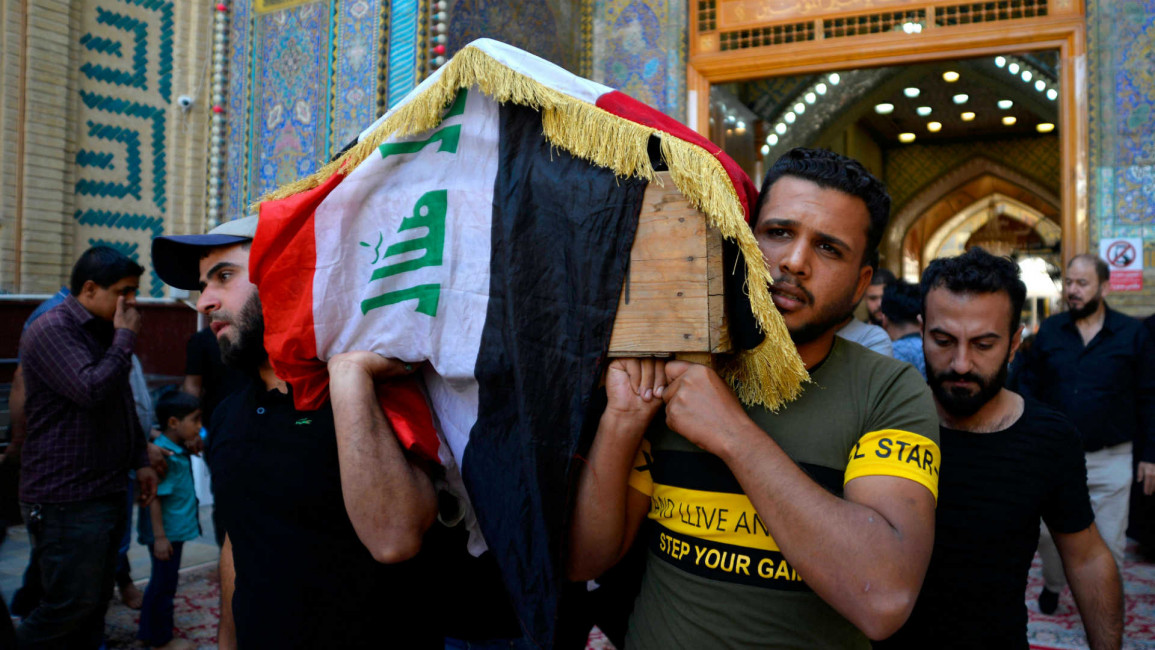Iraq authorities arrest activists and block internet as protests ramp up
At least three protesters were killed by security forces in southern Iraq, officials confirmed on Tuesday, as authorities tried to reopen the country's main port at Umm Qasr in Basra, which had been blocked by demonstrators for the past three days.
Meanwhile, four more demonstrators were shot dead by security forces in the holy city of Karbala, about 100 kilometres (60 miles) south of Baghdad, overnight on Monday, after protesting near the Iranian consulate.
Comment: Tuk-tuks of Tahrir: The unlikely symbol of a revolution in Iraq
Iraq's security forces have come under fire for their brutal tactics used to suppress - and kill - protesters angry at government corruption, unemployment, and foreign interference in domestic politics.
Monday marked an especially violent day in the month-long protest campaign, as protesters gathered outside government buildings in the capital and stormed the Iranian consulate in Karbala.
In Baghdad, protesters overcame barricades on a bridge over the Tigris River on Monday leading towards the headquarters of the state television channel and the prime minister's office.
Twitter Post
|
Protesters set tires and dumpsters ablaze within 500 metres of the prime minister's office, sending huge clouds of black smoke into the sky, before being violently dispersed by live bullets and tear gas.
Security forces have killed at least 267 people since early October and wounded over 11,000 during two major waves of protests, deploying snipers and shooting military-grade tear gas grenades at point blank range against protesters.
Internet blocked as activists fear more violence
On Tuesday afternoon, an internet blackout was reimposed across Iraq with the exception of the autonomous Kurdish region in the north. There was a brief pause on Tuesday morning, in an attempt to quell the gatherings concentrated mainly in the capital and across the south.
Cyber security NGO NetBlocks said Tuesday that the blackout is "the most severe telecommunication restriction to have been imposed by Iraq's government since protests began" on 1 October.
The blackouts worried activists, who feared a repeat of last month's brutal repression campaign which followed a series of internet cuts.
From 3 October, Baghdad cut the internet, only reconnecting it two weeks later. Blocks on social media websites remain in force, but can be bypassed in part by using a virtual private network (VPN) application.
Arrest campaign sweeps Iraq
Iraqi authorities carried out the largest campaign of arrests since mass protests began at the start of October on Monday night.
Security forces seized activists and demonstrators in Baghdad, Karbala, Dhi Qar, Maysan, Basra and several other cities, security sources told The New Arab’s Arabic-language service, adding that most were seized at their homes without warrants
According to an interior ministry official, intelligence and SWAT teams arrested dozens of activists during the internet blackout across Baghdad as well as Karbala, Maysan, Dhi Qar, Basra and other areas, targeting in particular activists, bloggers and other prominent figures among the demonstations.
Twitter Post
|
Eyewitnesses saw pickup trucks belonging to security services transporting groups of blindfolded young men near the Allawi Tunnel, towards the police station in the Karrada district of Baghdad.
The arrests come as the fate of abducted activist Saba Mahdawi remains unknown, after she was seized by a group of armed men in central Baghdad as she was returning from the protests on Saturday night.
Activists have criticised the government for inaction over Mahdawi's case, claiming the registration plate of the car was recorded.
Armed pro-government and Iran-affiliated militias are feared to be intimidating protesters on the streets.
PM calls for end to disruption
As authorities waged violence on the streets on Monday evening, embattled Prime Minister Adel Abdul Mahdi met with senior judicial and security officials at the Federal Police Headquarters.
The meeting was also attended by Parliament Speaker Mohammed Halbousi and Chief Justice Faiq Zaidan, as well as Abu Mahdi al-Muhandis, the leader of the Iran-backed Shia paramilitary group the Hashed al-Shaabi or PMF.
Leaders discussed ways to restore stability while preserving the right to protest and protecting private property.
Abdul-Mahdi has expressed support for the protesters' demands and condemned violence on all sides but resisted calls to step down unless a suitable replacement is found.
He has called on the demonstrators to reopen roads so life can return to normal and said the disruptions caused by the protests are costing the country billions of dollars.
Read more: 'Our youth are being shot at': Iraq's protests in pictures
However, protesters continue to call for the premier’s resignation along with overhaul of the country’s political leadership.
A key grievance at the centre of much popular unrest in Iraq is the corruption and mismanagement that runs through the entire political class.
Despite an uptick in oil revenues, public services remain in decline, post-conflict reconstruction remains slow and over a fifth of the population live in poverty.
Agencies contributed to this report.
Follow us on Twitter and Instagram to stay connected


![Minnesota Tim Walz is working to court Muslim voters. [Getty]](/sites/default/files/styles/image_684x385/public/2169747529.jpeg?h=a5f2f23a&itok=b63Wif2V)




![Debris near Rafic Hariri International Airport [Getty]](/sites/default/files/styles/image_330x185/public/2176162423.jpeg?h=a5f2f23a&itok=MCSK9mkM)
![An Israeli air strike on Jabalia killed teenage journalist Hassan Hamad [Screengrab/X]](/sites/default/files/styles/image_330x185/public/2024-10/hassan%20hamad1.jpg?h=c12e0b96&itok=Rd_dyCVp)
